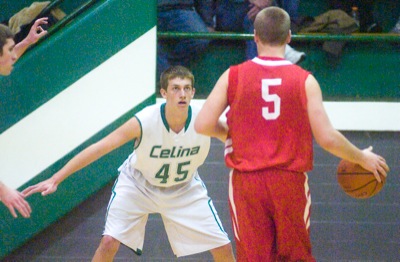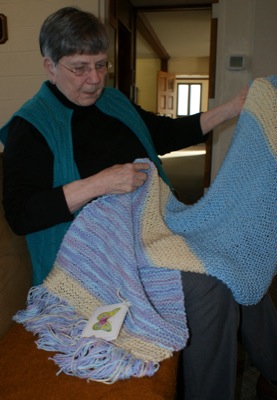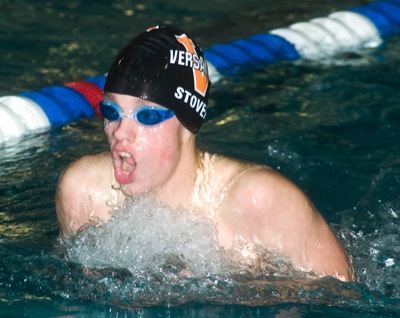Monday, February 4th, 2013
Lake alum treatment unlikely
By Nancy Allen
GRAND LAKE - The chance of Grand Lake receiving an alum treatment this year is slim, according to Ohio Department of Natural Resources Director Jim Zehringer.
"With the shallowness of the lake and the wind that keeps stirring (sediment) up, scientists say the benefit is marginal and our money may be better spent keeping it from coming in and treating the lake in other ways," Zehringer told those at the Lake Improvement Association meeting Saturday.
Two alum treatments on the lake the last two years cost the state $8.4 million, which Zehringer called "expensive." The state twice has treated the 4,900-acre center of the lake with alum in an attempt to curtail algae blooms. Alum deactivates phosphorous, algae's favorite food.
In 2011, the alum treatment reduced phosphorous levels by up to 56 percent in the lake's center and 20 to 30 percent in untreated areas. Officials already have warned it may not have worked as well in 2012 due to three times as much wind stirring up sediment. A long-awaited report on the effectiveness of last year's alum treatment is expected to be done next month, Zehringer said.
Zehringer, from Fort Recovery, also noted that a lawsuit over flooded land from the lake's West Bank spillway will be a factor on how much money is spent on lake water quality improvements.
The Ohio Supreme Court in December 2011 ruled the state must compensate 86 landowners because the spillway opened in 1997 caused increased flooding on their land. During the first of roughly 50 trials to be held to determine compensation, a Mercer County jury on Jan. 11 ruled the state owed one couple $1.9 million for 222 acres of flooded land.
Zehringer pledged the state will pay those farmers who deserve compensation but fight other cases.
"We're going to continue to fight for the citizens of Ohio because it's your money, to make sure it's well spent," he said.
Zehringer said four of five lake watershed farmers who were issued chief's orders for not completing nutrient management plans on time are close to completing the documents. The documents require soil testing and spell out how to manage manure so it does not pollute water. The plans are one of many new rules farmers must follow due to the watershed being designated distressed.
"We hope to drastically reduce the amount of nutrients in this lake, but that does nothing for the nutrients already in the lake, so we're going to continue to dredge and remove rough fish," he said.
Zehringer discredited talk in the community that the heightened focus on Lake Erie's algae woes will result in fewer dollars for Grand Lake.
"Anything we can do to promote Grand Lake we will do," he said.
Lake Restoration Commission Manager Milt Miller said the state plans a "very aggressive" dredging plan this year to address internal loading, the phosphorous in the muck at the lake bottom. Last year dredge crews removed 289,000 cubic yards of sediment, a new record.
A 95-acre area off the shore at Prairie Creek will be able to hold 770,000 cubic yards of sediment, Miller said.
The area off Prairie Creek will become a wetland. Nearly 3,000 acres of natural littoral wetlands that surrounded the lake's shores decades ago have been lost to development. Wetlands act as natural kidneys that filter out sediment and phosphorous. An oval berm made mostly of riprap (rocks) will separate the wetland area from the main body of the lake to contain the sediment. The berm will be constructed this year, Miller said.
"Studies tell us 140,000 cubic yards comes into our lake every year and for a while we used to dredge 40,000 to 60,000 cubic yards a year, so we've stepped it up," Miller said.
The LRC is comprised of numerous local, county and state groups raising money and trying to find science-based solutions to restore the lake.
Miller reported the Celina Lion's Club this year will install linear aeration in Pullman Bay, a popular fishing spot along Lakeshore Drive in Celina. Various lake residents have improved dissolved oxygen levels and reduced sediment and algae formation in their channels by installing aeration. The city of Celina will pay for the electricity to power the aeration pump, and the LRC will pay for a scientific study to evaluate the effectiveness.
"All the experts, scientists and engineers have said our lake would benefit with more aeration and circulation, so we're going to target that this year," Miller said. "We're going to use this as an opportunity to get third party validation on its worth."
Brian Miller, manager of Grand Lake St. Marys State Park, said the state plans to DNA test carcasses from fish caught by ice fisherman recently on Grand Lake to determine if they are walleye or saugeye. A saugeye is a cross between a walleye and a sauger, and the state has stocked both species in the lake over the years. The two species are difficult to differentiate. Ice anglers hauled in large numbers of big walleye and/or saugeye in recent weeks. This is the first time large numbers of either species have been caught at one time.
"It's to determine ... which fish is most successful to possibly restart stocking," Miller said. "There's been no stocking since 2010 when we put in saugeye."
Miller said the state also plans to stock yellow perch in the lake, but no timeframe has been discussed.
Miller also reported,
• the state will grind ash trees cut on state park land to make free mulch available to the public this spring. The trees were cut due to being infected with emerald ash borer insects.
• stumps will be removed from the lake this spring if water levels aren't too high.
• the state park has received three new fish nets to remove carp and other rough fish from the lake. The fish contribute to poor water quality by secreting phosphorous in their waste and stirring up sediment.
• the East Bank dog park is slated to open this spring.



